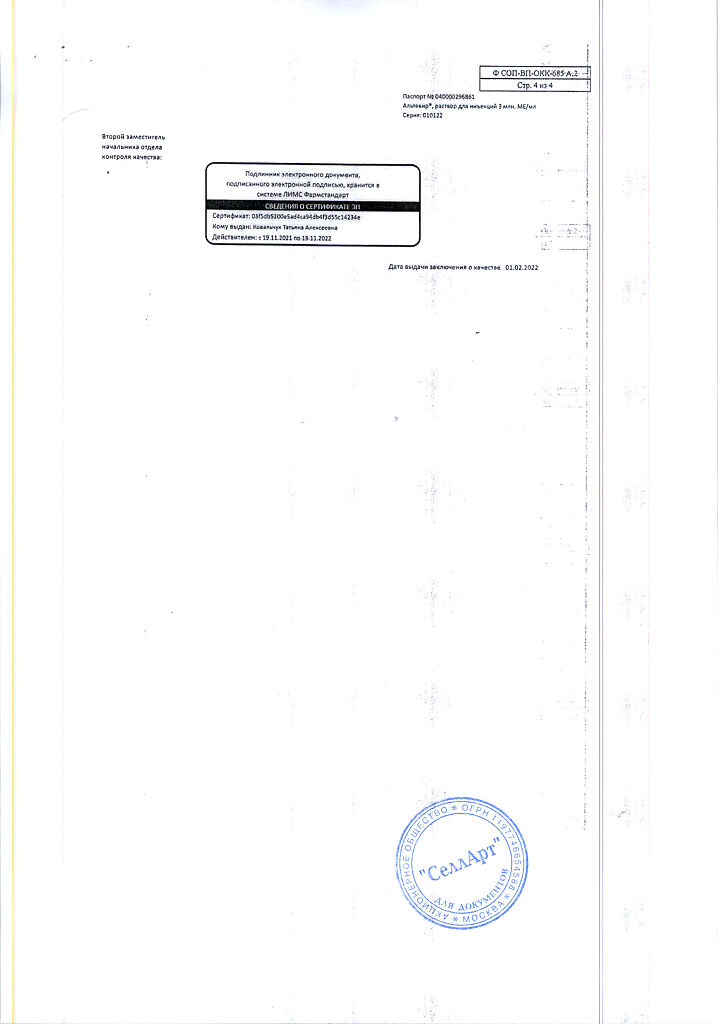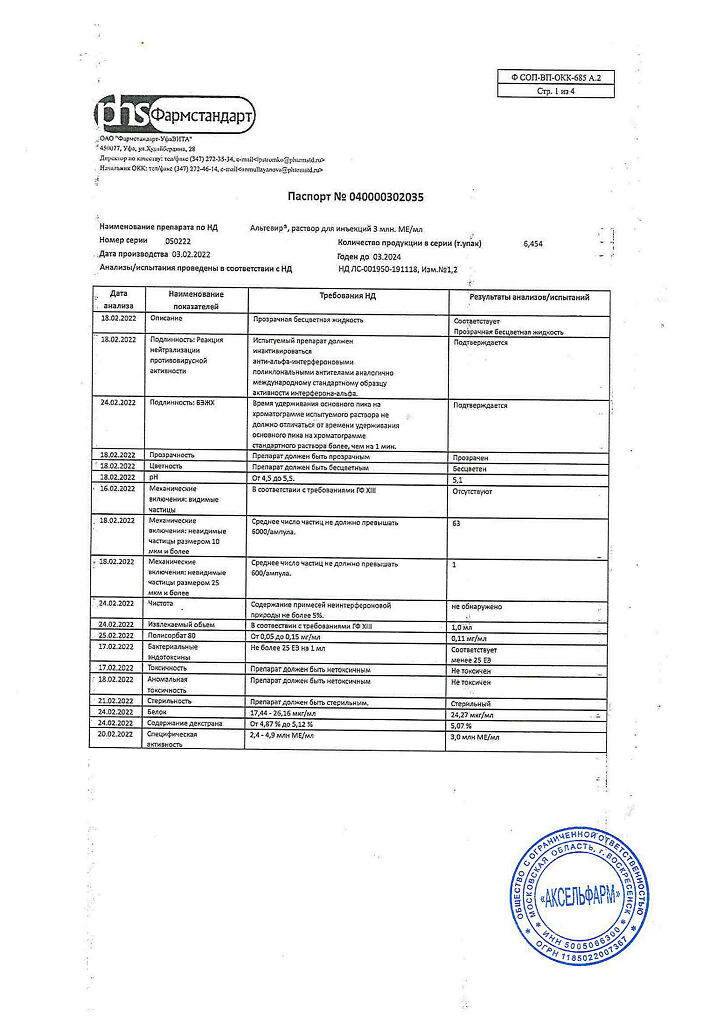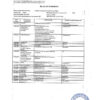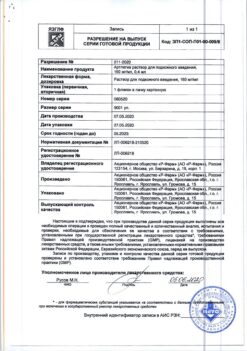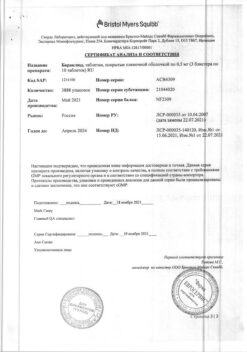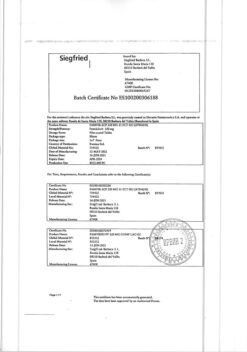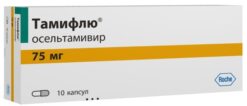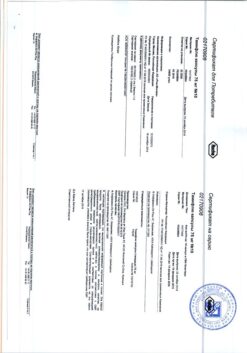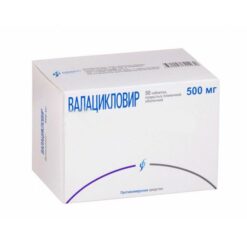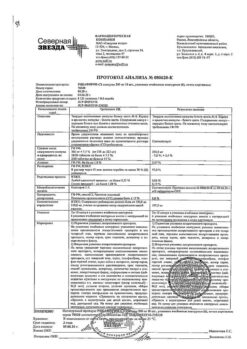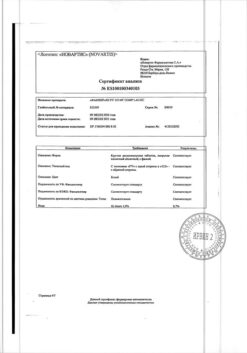No products in the cart.
Description
Pharmgroup:
Interferon. An antitumor, antiviral, and immunomodulatory drug.
Pharmic action:
Interferon. Altevir® has antiviral, immunomodulatory antiproliferative and antitumor action.
Interferon alfa-2b, interacting with specific receptors on the cell surface, initiates a complex chain of changes inside the cell, including induction of synthesis of specific cytokines and enzymes, disrupts synthesis of viral RNA and virus proteins in the cell. These changes result in non-specific antiviral and antiproliferative activity associated with prevention of virus replication in the cell, inhibition of cell proliferation and immunomodulatory action of interferon.
Interferon alfa-2b stimulates the process of antigen presentation to immunocompetent cells and has the ability to stimulate phagocytic activity of macrophages and cytotoxic activity of T-cells and “natural killers” involved in antiviral immunity.
It prevents proliferation of cells, especially tumor cells. It has a suppressive effect on the synthesis of some oncogenes leading to inhibition of tumor growth.
Pharmacokinetics:
If interferon alfa-2b is administered p/k or i.m. its bioavailability is from 80% to 100%. After administering interferon alfa-2b Tmax in plasma is 4-12 hours, T1/2 is 2-6 hours. In 16-24 hours after administration recombinant interferon in blood serum is not determined.
Metabolism is carried out in the liver.
Interferons alpha can disrupt oxidative metabolic processes by reducing the activity of microsomal liver enzymes of cytochrome P450 system.
Extracted mainly by the kidneys through glomerular filtration.
Indications
Indications
As part of complex therapy in adults:
with chronic viral hepatitis B without signs of liver cirrhosis;
for chronic viral hepatitis C in the absence of symptoms of liver failure (monotherapy or combination therapy with ribavirin);
with papillomatosis of the larynx;
for genital warts;
for hairy cell leukemia, chronic myeloid leukemia, non-Hodgkin’s lymphoma, melanoma, multiple myeloma, Kaposi’s sarcoma against the background of AIDS, progressive kidney cancer.
Pharmacological effect
Pharmacological effect
Pharmgroup:
Interferon. Antitumor, antiviral and immunomodulatory drug.
Pharmaceutical action:
Interferon. Altevir® has antiviral, immunomodulatory, antiproliferative and antitumor effects.
Interferon alpha-2b, interacting with specific receptors on the cell surface, initiates a complex chain of changes inside the cell, including the induction of the synthesis of a number of specific cytokines and enzymes, and disrupts the synthesis of viral RNA and viral proteins in the cell. The result of these changes is nonspecific antiviral and antiproliferative activity associated with the prevention of viral replication in the cell, inhibition of cell proliferation and the immunomodulatory effect of interferon.
Interferon alpha-2b stimulates the process of antigen presentation to immunocompetent cells, has the ability to stimulate the phagocytic activity of macrophages, as well as the cytotoxic activity of T cells and “natural killer” cells involved in antiviral immunity.
Prevents cell proliferation, especially tumor cells. It has an inhibitory effect on the synthesis of some oncogenes, leading to inhibition of tumor growth.
Pharmacokinetics:
With subcutaneous or intramuscular administration of interferon alfa-2b, its bioavailability ranges from 80% to 100%. After administration of interferon alpha-2b, Tmax in blood plasma is 4-12 hours, T1/2 – 2-6 hours. 16-24 hours after administration, recombinant interferon is not detected in blood serum.
Metabolism occurs in the liver.
Alpha interferons can disrupt oxidative metabolic processes, reducing the activity of microsomal liver enzymes of the cytochrome P450 system.
It is excreted mainly by the kidneys by glomerular filtration.
Special instructions
Special instructions
Before treatment with Altevir for chronic viral hepatitis B and C, it is recommended to perform a liver biopsy to assess the degree of liver damage (signs of active inflammatory process and/or fibrosis). The effectiveness of treatment of chronic hepatitis C increases with combination therapy with Altevir and ribavirin. The use of Altevir is not effective in the development of decompensated liver cirrhosis or hepatic coma.
If side effects occur during treatment with Altevir, the dose of the drug should be reduced by 50% or the drug should be temporarily discontinued until they disappear. If side effects persist or recur after dose reduction, or disease progression is observed, treatment with Altevir should be discontinued.
If the platelet level decreases below 50×109/l or the granulocyte level below 0.75×109/l, it is recommended to reduce the Altevir dose by 2 times with blood test monitoring after 1 week. If these changes persist, Altevir should be discontinued.
If the platelet level decreases below 25×109/l or the granulocyte level below 0.5×109/l, it is recommended to discontinue Altevir with blood test monitoring after 1 week.
In patients receiving interferon alpha-2b preparations, antibodies that neutralize its antiviral activity can be detected in the blood serum. In almost all cases, antibody titers are low, their appearance does not lead to a decrease in the effectiveness of treatment or the occurrence of other autoimmune disorders.
Preparation of a solution for intravenous administration: take the volume of Altevir solution required to prepare the required dose, add it to 100 ml of a sterile 0.9% NaCl solution and administer it over 20 minutes.
Active ingredient
Active ingredient
Interferon alpha-2b
Composition
Composition
1 ml of solution contains:
3 million IU of human recombinant interferon alpha-2b;
excipients:
sodium acetate,
sodium chloride,
ethylenediaminetetraacetic acid disodium salt,
Twin 80,
dextran 40,
water for injections.
Contraindications
Contraindications
Hypersensitivity to recombinant interferon alfa-2b or any of the components of the drug, a history of severe cardiovascular diseases (uncontrolled CHF, recent myocardial infarction, severe heart rhythm disturbances), severe renal and/or liver failure (including those caused by the presence of metastases), epilepsy and other severe disorders of the central nervous system, especially expressed by depression, suicidal thoughts and attempts (including a history), chronic hepatitis with decompensated cirrhosis of the liver and in patients receiving or recently receiving treatment with immunosuppressive drugs (not counting the completed short-term course of treatment with corticosteroids), autoimmune hepatitis or other autoimmune disease, as well as taking immunosuppressive drugs after transplantation, thyroid disease that cannot be controlled by generally accepted therapeutic methods. Decompensated lung diseases (including COPD), decompensated diabetes mellitus, hypercoagulation (including thrombophlebitis, pulmonary embolism), severe myelosuppression, pregnancy, lactation.
Side Effects
Side Effects
Most often – fever, weakness (they are dose-dependent and reversible reactions, disappear within 72 hours after a break in treatment or its cessation), headache, myalgia, chills, loss of appetite, nausea.
Less common: vomiting, diarrhea, arthralgia, asthenia, drowsiness, dizziness, dry mouth, alopecia, depression, suicidal thoughts and attempts, malaise, increased sweating, change in taste, irritability, insomnia, decreased blood pressure.
Rarely – abdominal pain, skin rash, nervousness, itchy skin, anxiety, weight loss, dyspepsia, tachycardia, autoimmune thyroiditis. Changes (reversible) in laboratory parameters: leukopenia, granulocytopenia, decreased Hb, thrombocytopenia, increased activity of liver enzymes.
Storage conditions
Storage conditions
At 2–8 °C
Shelf life
Shelf life
18 months
Manufacturer
Manufacturer
Pharmapark, Russia
Additional information
| Shelf life | 18 months |
|---|---|
| Conditions of storage | At 2-8 °C |
| Manufacturer | Farmapark, Russia |
| Medication form | solution for injection |
| Brand | Farmapark |
Related products
Buy Altevir, 3 ml/ml 1 ml 5 pcs with delivery to USA, UK, Europe and over 120 other countries.



